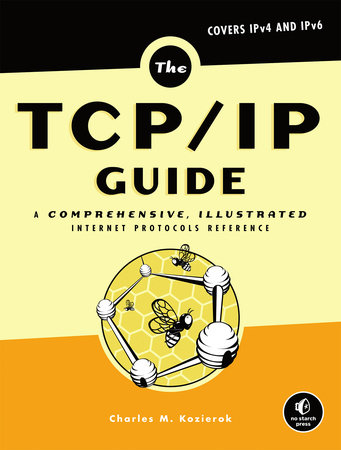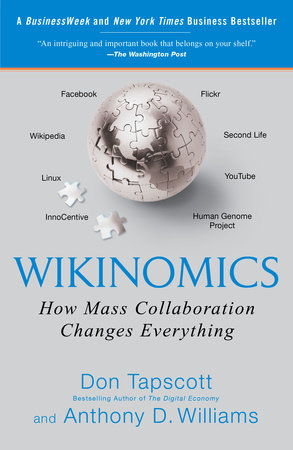

The TCP/IP Guide
By Charles M. Kozierok
By Charles M. Kozierok
By Charles M. Kozierok
By Charles M. Kozierok
Category: Science & Technology
Category: Science & Technology

-
$99.95
Oct 01, 2005 | ISBN 9781593270476
-
Oct 01, 2005 | ISBN 9781593270957
YOU MAY ALSO LIKE

Wikinomics

The Right Kind of Crazy

Talking to Robots
Praise
“A New TCP/IP Classic. . . Keeps things interesting and flowing well enough that working one’s way through. . . Actually entertaining instead of torture.”
—Slashdot
“The most comprehensive guide to TCP/IP protocols we have ever come across. It also is the most readable. This is a book that will be staying on our shelves, and we highly recommend it.”
—Network World
“This is a really well-done book, and well worth the price if you need up-to-date, easy-to-digest information about TCP/IP. I wish I’d written this puppy.”
—IBM’s developerWorks
“Nicely organized, from an introduction to networking through administration and troubleshooting, the book clearly explains each topic.”
—Library Journal
“I’ve never seen a book on this subject before to match this one . . . It’s as close to indispensable as a printed work can get.”
—NetPerformance.com
“The book is well-organized, well-illustrated, and has a conversational tone that makes it easy to read and learn even for networking novices.”
—Windows Networking
“It’s informative and easy to read, even when discussing rather nasty protocols, and when it covers something, it generally covers it quite completely.”
—;login:
“Due to size, it may seem like this book is solely for students or engineers. However, The TCP/IP Guide is great for anyone and everyone as it can act both as a reference guide and a textbook.”
—Linux Security
“The author does a great job of discussing the significance of the information he is presenting . . . Whereas some books seem to throw illustrations in simply to break up the text, this book adds just the right amount in the right places to make sure you understand.”
—Linux Magazine
“Covers a great breadth and depth of information . . . an excellent reference.” (4.5 out of 5 stars)
—About.com
“This is both an encyclopedic and comprehensible guide to the TCP/IP protocol suite that will appeal to newcomers and the seasoned professional.”
—DominoPower Magazine
“Kozierok’s description of IPv4 addressing is probably the clearest I have ever read. And his chapters about IP subnetting and classless addressing are masterful. If I ever teach communication protocols again, my lecture notes will owe a great deal to this book. . . I continue to be astounded that this much information, presented in a clear and entertaining fashion, is available for so little.”
—Kickstart News
“A mind-boggling contribution to understanding and applying TCP/IP protocols to network administration. . .This is a truly impressive work. . .comprehensive and readable.”
—JavaRanch
“This is the kind of reference book that might be worth reading cover to cover in spite of its bulk.”
—Open.ITWorld.com
“This book is the Real Deal. . . If you’ve read as many bad IT books as I have, you will appreciate the mastery of Kozierok’s achievement. His warmth and style don’t smack you in the face at first, but keep reading, and you’ll discover an IT brother.”
—WatchGuard Wire
“Now I can retire all my other TCP/IP books I have gathering dust on my bookshelves… This book however may become timeless, because it not only talks about, but shows everything.”
—MacCompanion
“Smartly illustrated, the book is easily navigated for both brief overviews of the subject matter and more in-depth study of TCP/IP-related topics… A welcome change from the information congestion common on the Information Superhighway.”
—About This Particular Mac (ATPM)
“Focuses on the nuts and bolts of how the protocols work while maintaining an emphasis on the present state of the art (including extensive coverage of IPv6).”
—Book News
“A must-have addition to the libraries of internetworking students, educators, networking professionals, and those working toward certification.”
—Golden Triangle PC Club
“Anything and everything you ever wanted to or needed to know about the ins and outs of the TCP/IP. . . you could not find a better, more comprehensive book on the subject. I would give it two thumbs up for sure.”
—Cariboo Computer Magazine
Table Of Contents
INTRODUCTION
SECTION I: TCP/IP OVERVIEW AND BACKGROUND INFORMATION
PART I-1: NETWORKING FUNDAMENTALS
Chapter 1: Networking Introduction, Characteristics and Types
Chapter 2: Network Performance Issues and Concepts
Chapter 3: Network Standards and Standards Organizations
Chapter 4: A Review of Data Representation and the Mathematics of Computing
PART I-2: THE OPEN SYSTEM INTERCONNECTION (OSI) REFERENCE MODEL
Chapter 5: General OSI Reference Model Issues and Concepts
Chapter 6: OSI Reference Model Layers
Chapter 7: OSI Reference Model Summary
PART I-3: TCP/IP PROTOCOL SUITE AND ARCHITECTURE
Chapter 8: TCP/IP Protocol Suite and Architecture
SECTION II: TCP/IP LOWER-LAYER CORE PROTOCOLS
PART II-1: TCP/IP NETWORK INTERFACE LAYER PROTOCOLS
Chapter 9: TCP/IP Serial Line Internet Protocol (SLIP) and Point-to-Point Protocol (PPP) Overview and Fundamentals
Chapter 10: PPP Core Protocols: Link Control, Network Control, and Authentication
Chapter 11: PPP Feature Protocols
Chapter 12: PPP Protocol Frame Formats
PART II-2: TCP/IP NETWORK INTERFACE/INTERNET LAYER CONNECTION PROTOCOLS
Chapter 13: Address Resolution and the TCP/IP Address Resolution Protocol (ARP)
Chapter 14: Reverse Address Resolution and the TCP/IP Reverse Address Resolution Protocol (RARP)
PART II-3: INTERNET PROTOCOL VERSION 4 (IP/IPV4)
Chapter 15: Internet Protocol Versions, Concepts and Overview
Chapter 16: IPv4 Addressing Concepts and Issues
Chapter 17: IP “Classful” (Conventional) Addressing
Chapter 18: IP Subnet Addressing (Subnetting) Concepts
Chapter 19: IP Subnetting Practical Subnet Design and Address Determination Example
Chapter 20: IP Classless Addressing: Classless Inter-Domain Routing (CIDR)/Supernetting
Chapter 21: Internet Protocol Datagram Encapsulation and Formatting
Chapter 22: IP Datagram Size, Fragmentation, and Reassembly
Chapter 23: IP Routing and Multicasting
PART II-4: INTERNET PROTOCOL VERSION 6 (IPV6)
Chapter 24: IPv6 Overview, Changes, and Transition
Chapter 25: IPv6 Addressing
Chapter 26: IPv6 Datagram Encapsulation and Formatting
Chapter 27: IPv6 Datagram Size, Fragmentation, Reassembly, and Routing
PART II-5: IP-RELATED FEATURE PROTOCOLS
Chapter 28: IP Network Address Translation (NAT) Protocol
Chapter 29: IP Security (IPSec) Protocols
Chapter 30: Internet Protocol Mobility Support (Mobile IP)
PART II-6: IP SUPPORT PROTOCOLS (ICMP AND ND)
Chapter 31: ICMP Concepts and General Operation
Chapter 32: ICMPv4 Error Message Types and Formats
Chapter 33: ICMPv4 Informational Message Types and Formats
Chapter 34: ICMPv4 Error Message Types and Formats
Chapter 35: ICMPv4 Iformational Message Types and Formats
Chapter 36: IPv6 Neighbor Discovery (ND) Protocol
PART II-7: TCP/IP ROUTING PROTOCOLS (GATEWAY PROTOCOLS)
Chapter 37: Overview Of Key Routing Protocol Concepts
Chapter 38: Routing Information Protocol (RIP, RIP-2, and RIPLNG)
Chapter 39: Open Shortest Path First (OSPF)
Chapter 40: Border Gateway Protocol (BGP/BGP-4)
Chapter 41: Other Interior Routing Protocols
PART II-8: TCP/IP TRANSPORT LAYER PROTOCOLS
Chapter 42: Overview and Comparison of TCP and UDP
Chapter 43: TCP and UDP Addressing: Ports and Sockets
Chapter 44: TCP/IP User Datagram Protocol (UDP)
Chapter 45: TCP Overview, Functions, and Characteristics
Chapter 46: Transmission Control Protocol (TCP) Fundamentals and General Operation
Chapter 47: TCP Basic Operation: Connection Establishment, Management, and Termination
Chapter 48: TCP Message Formatting and Data Transfer
Chapter 49: TCP Reliability and Flow Control Features
SECTION III: TCP/IP APPLICATION LAYER PROTOCOLS
PART III-1: NAME SYSTEMS AND TCP/IP NAME REGISTRATION AND NAME RESOLUTION
Chapter 50: Name System Issues, Concepts, and Techniques
Chapter 51: TCP/IP Name Systems Overview and the Host Tables Name System
Chapter 52: Domain Name System (DNS) Overview, Functions, and Characteristics
Chapter 53: DNS Name Space, Architecture, and Terminology
Chapter 54: DNS Name Registration, Public Administration, Zones, and Authorities
Chapter 55: DNS Name Server Concepts and Operation
Chapter 56: DNS Resolution Concepts and Resolver Operations
Chapter 57: DNS Messaging and Message, Resource Record, and Master File Formats
PART III-2: NETWORK FILE AND RESOURCE SHARING PROTOCOLS AND THE TCP/IP NETWORK FILE SYSTEM (NFS)
Chapter 58: Network File and Resource Sharing and the TCP/IP Network File System (NFS)
PART III-3: HOST CONFIGURATION AND TCP/IP HOST CONFIGURATION PROTOCOLS (BOOTP AND DHCP)
Chapter 59: Host Configuration Concepts, Issues, and Motivation
Chapter 60: TCP/IP Bootstrap Protocol (BOOTP)
Chapter 61: DHCP Address Allocation Concepts
Chapter 62: DHCP Configuration and Operation
Chapter 63: DHCP Messaging, Message Types, and Formats
Chapter 64: DHCP Client/Server Implementation, Features, and IPV6 Support
PART III-4: TCP/IP NETWORK MANAGEMENT FRAMEWORK AND PROTOCOLS (SNMP AND RMON)
Chapter 65: TCP/IP Internet Standard Management Framework Overview
Chapter 66: TCP/IP Structure of Management Information (SMI) and Management Information Bases (MIBs)
Chapter 67: TCP/IP Simple Network Management Protocol (SNMP) Concepts and Operation
Chapter 68: SNMP Protocol Messaging and Message Formats
Chapter 69: TCP/IP Remote Network Monitoring (RMON)
PART III-5: TCP/IP APPLICATION LAYER ADDRESSING AND APPLICATION CATEGORIES
Chapter 70: TCP/IP Application Layer Addressing: Uniform Resource Identifiers, Locators, and Names (URIs, URLs and URNs)
Chapter 71: File and Message Transfer Overview and Application Categories
PART III-6: TCP/IP GENERAL FILE TRANSFER PROTOCOLS (FTP AND TFTP)
Chapter 72: File Transfer Protocol (FTP)
Chapter 73: Trivial File Transfer Protocol (TFTP)
PART III-7: TCP/IP ELECTRONIC MAIL SYSTEM: CONCEPTS AND PROTOCOLS
Chapter 74: TCP/IP Electronic Mail System Overview and Concepts
Chapter 75: TCP/IP Electronic Mail Addresses and Addressing
Chapter 76: TCP/IP Electronic Mail Message Formats and Message Processing: RFC 822 and MIME 1245
Chapter 77: TCP/IP Electronic Mail Delivery Protocol: The Simple Mail Transfer Protocol (SMTP)
Chapter 78: TCP/IP Electronic Mail Access and Retrieval Protocols and Methods
PART III-8: TCP/IP WORLD WIDE WEB AND THE HYPERTEXT TRANSFER PROTOCOL (HTTP)
Chapter 79: World Wide Web and Hypertext Overview and Concepts
Chapter 80: HTTP General Operation and Connections
Chapter 81: HTTP Messages, Methods, and Status Codes
Chapter 82: HTTP Message Headers
Chapter 83: HTTP Entities, Transfers, Coding Methods, and Content Management
Chapter 84: HTTP Features, Capabilities, and Issues
PART III-9: OTHER FILE AND MESSAGE TRANSFER APPLICATIONS
Chapter 85: Usenet (Network News) and the TCP/IP Network News Transfer Protocol (NNTP)
Chapter 86: Gopher Protocol (Gopher)
PART III-10: INTERACTIVE AND ADMINISTRATIVE UTILITIES AND PROTOCOLS
Chapter 87: TCP/IP Interactive and Remote Application Protocols
Chapter 88: TCP/IP Administration and Troubleshooting Utilities and Protocols
INDEX/
21 Books You’ve Been Meaning to Read
Just for joining you’ll get personalized recommendations on your dashboard daily and features only for members.
Find Out More Join Now Sign In












